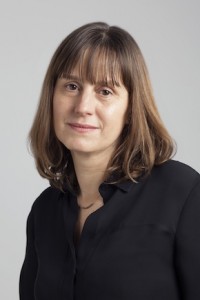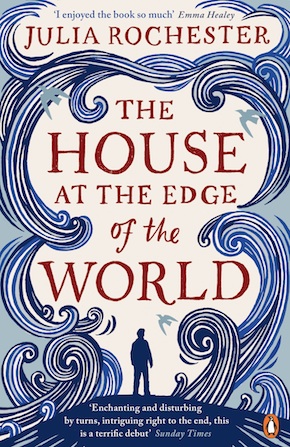Dartmoor downpour
by Julia RochesterJulia Rochester’s debut novel The House at the Edge of the World is longlisted for both the Baileys Women’s Prize for Fiction and the Desmond Elliott Prize for Fiction 2016. It’s a darkly comic and constantly surprising psychological mystery about comforts and destructive forces among close relatives. A recent family get-together is dominated by foul weather, fun and games, heated debate and the promise of tea.
Good Friday
The family is gathering in Devon for the long weekend. The weather is incredible – wonderful June sunshine. But the forecast for tomorrow according to the BBC Weather site is still, as it has been all week, a big black cloud with two large raindrops, indicating heavy rain. Husband Scott is irritated that I keep pointing this out. He is Canadian, and therefore never happier than when messing about with the paraphernalia of outdoor pursuits. He is preparing a rucksack for a long hike on Dartmoor tomorrow and has packed a picnic blanket.
Weather is a preoccupation of mine this weekend as I am writing a piece about weather in books. Since The House at the Edge of the World was longlisted (as a writer, I have to say that I object to turning ‘long list’ into a verb, but I can see that it is more efficient than saying ‘placed on the long list’) for the Baileys Prize, I have been approached to write a number of pieces. These short articles are good for me, as I usually float, over a period of years, on an ocean of ideas, which may or may not drift together to form a book. Actual deadlines are a novelty and make me feel mentally acute.
For the weather piece I have pulled out a copy of Landmarks by Robert MacFarlane. I am currently proselytising this incredible book, about the words used in the languages of these British islands to describe the natural world. It is also about the loss of such words as our relationship with our environment erodes. He writes: “Once a landscape goes undescribed and therefore unguarded, it becomes more vulnerable to unwise use or improper action.”
Meanwhile, Sister Sophie and family have taken three hours to crawl from Hackney to Reading. They eventually arrive around teatime, having taken seven hours to get here. We eat hot cross buns.
This is how our children will spend their lives, like in that film with Bruce Willis where people send robot versions of themselves out into the world to live their lives for them.”
Daughter Inês, aged eleven, and niece Rose, aged nine, cook dinner from Rose’s Millie Molly Mandy cookbook. The kitchen is a mess but the food is great – a proper three-course meal for nine people. We welcome this development. However, I have been reading aloud from Landmarks the list of words deleted from the Oxford Junior Dictionary as being irrelevant to a modern childhood. It is an extensive list, which includes fern, buttercup, ash and beech. At the same time as celebrating our children’s growing competence we take a moment to fear for their future. I recently tried on one of those virtual-reality headset thingies and visited the Australian Outback. It was extraordinary, but made me feel seasick. This is how our children will spend their lives (like in that film Surrogates – the one with Bruce Willis, where people send robot versions of themselves out into the world to live their lives for them).
I check the weather report for Okehampton tomorrow. In addition to the dark cloud with double-raindrop is a triangle framing an exclamation mark. This indicates an extreme weather warning. Scott continues to be irritated at my tendency to worry about things in advance.
Saturday
Scott is astounded to discover that there is a gale outside and that we are enveloped by sea mist. (How he slept through it is incomprehensible to me – I have been awake all night, listening to the windows banging.)
We go to Dartmoor. Sophie and Brother-in-Law Ranjit come along as planned, determined not to be out-manned by us. We stride out into the wind and rain. I recall an image I used in The House at the Edge of the World: “wind-propelled water darts.” It is more apt than I realised when I wrote it. The rain is painful on our exposed faces. Dartmoor is beautiful, even in this weather, but we are looking at our feet. We decide to take the shorter loop and climb up Oke Tor to take shelter between slabs of granite where we drink tea and eat peanut butter bars, but do not unpack the picnic blanket. Everyone except me pours out their boots and wrings out their socks. My theory is that my feet would then be cold as well as wet – now, at least, they are enveloped in a warm soup. The way back is more enjoyable as the wind is now behind us and we can look about and chat. There is nothing like the tingle of skin at the end of a cold walk on Dartmoor followed by a hot bath.
Ranjit cooks a killer curry for lunch. Sister Kate and Polish not-brother-in-law Robert have been looking after the kids, dying eggs with the onion skin that they have been saving for weeks. (Kate is the favourite aunt, and the nieces are keen for her to marry Robert, mainly so that they can be bridesmaids. They have cornered him to demand to know his intentions and make a point of calling him Uncle Robert. Niece Charlotte, who wants to be a fashion designer, has taken to sketching wedding dresses.) But the kids have finished being stimulated by creative activity, and now Kate and Robert sit alone at the kitchen table, scratching patterns into the coloured eggshells.
After the children have been sent to bed with their Kindles and their iPads, Dad and I sit down to write the clues for their Easter egg/treasure hunt tomorrow. This has become a family tradition, which the kids love almost as much as the adults. Dad is the poet in the family, which is how he gets the job. We amuse ourselves by writing bad verses. For example:
Where has all the chocolate gone?
Find it near a hut of stone.
By the time we get to the tenth couplet, we are glad it’s over. Even bad verse is hard to write.
Easter Sunday
Robert demonstrates the Polish tradition of Easter egg fighting. We all take to it. Then the kids go off into the rain/sunshine/rain to find Easter eggs and clues, which we have placed around the village. They have a wonderful time, although they are stumped by:
Where “no road to the beach” is written
There is chocolate to be bitten
They have to climb all the way back up the hill for help. This makes them cross, which makes us cross – we have spoiled our children.
Otherwise, harmony reigns. We chat and make tea and flick through property porn magazines and point out lovely things. For my mother, creating beautiful domestic environments was a moral imperative and the habit of prettifying has been ingrained in all of us. Since her death, standards have slipped somewhat – she would only ever have made tea in a teapot, and the milk would have been in a jug. We all miss her intensely, but quietly, in twos.
Internationalism is all very well at home, but not necessarily to be desired at international level. It turns out the family is divided.”
Brother Richard goes to pick up his daughters and we are complete and enjoy a full family feast of lamb. Kate is a vegetarian, which we have been forgetting for twenty-five years. Always, at the last minute, someone remembers that there is a limp slice of salmon in the fridge for her. It is testament to her immense kindness that she has never once complained.
The family gathers around the fire. Scott, who has endured two days of talk about quilts, tiles, ceramics and loft conversion fantasies, asks what we all think about Brexit. Very quickly, the harmony of our international family disintegrates. Internationalism is all very well at home, but not necessarily to be desired at international level. It turns out the family is divided. There is shouting. Only Robert, who doesn’t have a vote, is sane – mainly because he can make two small bottles of beer last all night. Someone makes a joke about him having to leave the country if we leave the EU. Kate doesn’t find it funny. Someone else points out that getting married would solve that problem. The sisters retreat to the kitchen where we are perplexed about London girls running off to be war brides. As I climb the stair the rum is being brought out, but, fortunately, five minutes later there is a power cut and everyone stumbles to bed in the dark.
Easter Monday
No one mentions Brexit. Everyone offers everyone else cups of tea – apart from Scott. He has been living in Britain for twenty years, but is still perplexed by this ritual. The first time I took him to meet the parents, he pulled me aside and said, “You have to get your mother to stop offering me tea!” My mother wasn’t British either, but German. However, for her, tea was simply a substitute for coffee, which was a reason for cake, which is the entire point of social interaction in Germany. The drift back to London begins. People are driven to stations and waved off up the road. Scott points out to me, that, despite the intense tea offering, the actual tea never seemed to materialise.
 Julia Rochester grew up in East Devon on the Exe Estuary. She studied German and Portuguese and has lived and worked in Germany and Brazil. In the past she was a researcher and campaigner on Amnesty International’s Brazil Team, set up her own small publishing company, Corvo Books, and worked for the BBC World Service. She lives in London with her husband and daughter. The House at the Edge of the World is out now in paperback from Penguin. Read more.
Julia Rochester grew up in East Devon on the Exe Estuary. She studied German and Portuguese and has lived and worked in Germany and Brazil. In the past she was a researcher and campaigner on Amnesty International’s Brazil Team, set up her own small publishing company, Corvo Books, and worked for the BBC World Service. She lives in London with her husband and daughter. The House at the Edge of the World is out now in paperback from Penguin. Read more.
juliarochester.com
Author portrait © Jochen Braun


